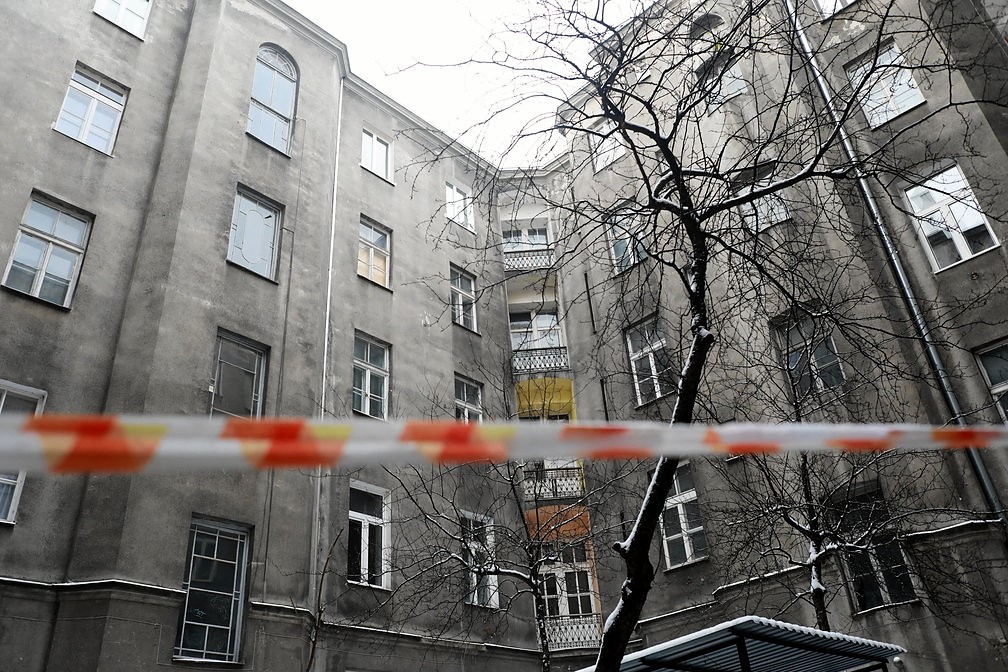New legislation on historical property restitution claims was passed with cross-party support by Poland’s parliament and this month signed into law by the president. That sparked a wave of criticism from Jewish groups, the United States and Israel, whose foreign minister called the measures “antisemitic”.
Critics argue that the new rules discriminate against Jewish Holocaust survivors and their descendants, preventing them from reclaiming property stolen under Nazi and communist rule. But proponents say that the law treats all applicants the same, and that the latest amendment was an obligatory implementation of a constitutional court ruling which will help end legal uncertainty.
Notes from Poland asked Michał Jabłoński, PhD, an advocate and partner in the Warsaw-based Jabłoński Koźmiński law firm who specialises in restitution cases, to explain why the new legislation was passed, what it changes, and whether it is discriminatory against Jewish claims.
Jewish groups have often criticised Poland in the past for being the only country in the region not to have passed a comprehensive restitution law. What has been the legal situation regarding restitution up to now?
Michał Jabłoński: Let me start with a short overview of the history: slightly after the war, in the 1940s and ‘50s, the communist regime, similarly to other countries under Soviet domination, aimed to transfer private property into the hands of the state (or at least to state-controlled cooperatives). Of course, it was not so easy, as there was huge social defiance against this approach.
This is why the communists used two excuses for their plans: the first was the so-called “agrarian reform” (nationalisation and division of aristocratic estates, and subsequent transfer of plots into the hands of small farmers). The second was the need to reconstruct Warsaw, which was almost completely destroyed by the Germans during and after the Uprising of 1944.
That was impossible without the concentration of ownership in public hands (which was the justification for the so-called Bierut Decree, nationalising most properties in the capital). In addition, there were around 20 further minor nationalisation and expropriation laws.
After the collapse of the communist regime, former owners (both Polish citizens and foreigners, including Jews) initiated efforts aimed at restitution of the properties. Unfortunately, Poland, unlike many other Central and Eastern European countries, failed to introduce regulations regarding restitution. Thus, there have been no formal bases for restitution claims in Poland.
The only way to get property back was to prove that the nationalisation or expropriation decision from the 1940s and ‘50s was issued in breach of…communist law. In other words, the communist government conducted nationalisation and expropriation, often ignoring rules that were created by the very same government.
As a consequence, some former owners had a valid legal claim to get property back (or compensation at least), but others were not so lucky (if the communists expropriated them with proper care). The general principle of nationalisation/expropriation has never been undermined in the Polish legal system and communist-era laws are still in force.
Such unfair situations have not been resolved and caused many irregularities, including the corruption accompanying some of the restitution cases.
The Guardian looks at the ongoing scandal in Warsaw over corruption surrounding the 'reprivatisation' of property nationalised by the communist authorities after the warhttps://t.co/JL1yNs16e2
— Notes from Poland 🇵🇱 (@notesfrompoland) December 18, 2017
Have Jews been disadvantaged in making claims?
To be clear, there has been no discrimination against Jewish claims in this process. Every former owner and their descendants encountered the same issues and obstacles linked with restitution claims, no matter their nationality or citizenship.
However, it is worth mentioning that between the 1940s and ‘70s Poland signed 12 international agreements – including with the USA, Canada and Switzerland – according to which those countries received a lump sum from Poland in exchange for a promise that they would themselves compensate losses of their citizens. There was no such agreement with Israel.
On the other hand, the Union of Jewish Communities in Poland was, as a religious organisation, among a group of privileged entities in the process of restitution after 1989 (of which the Catholic church was the biggest beneficiary).
Why was the new legislation introduced?
The chaotic situation with restitution led to unstable legal relationships and the risk of potential claims associated de facto with all real estate transactions in Warsaw (and other large cities with a huge percentage of previously nationalised or expropriated property).
That risk grew in 2012, when the Supreme Administrative Court issued a resolution stating that invalidation of an administrative decision leads to invalidity of all subsequent decisions based on the primary decision. That caused a “dominos of invalidity” effect and ruined legal certainty in various spheres, including real estate.
A kind of solution was reached by the Constitutional Tribunal (CT) in 2015: it stated that the invalidation of administrative decisions (on condition that such decisions are the sources of rights for individuals) issued in a flagrant breach of law after a significant passage of time affects legal certainty in a disproportionate manner and, as such, is against the constitution.
The CT’s ruling had a universal character and related to all administrative decisions that are sources of certain rights of individuals. Nevertheless, because of some technical issues (this particular CT ruling has not invalidated a provision of law, but merely declared the unconstitutionality of a certain manner of its application), the ruling did not have immediate legal effect and required an amendment of the law. That has not been done for six years since 2015 – and now here we are with the current legislation.
What will change under the new legislation?
Generally speaking, the new legislation, in its core part, is an implementation of the CT ruling from 2015, which required that decisions that were the source of an individual’s rights should not be invalidated after a “significant passage of time”.
That gave parliament discretion to choose a specific number of years, and in the end it was decided that decisions issued with a flagrant breach of law shall not be a subject of invalidity if more than 30 years has passed since the decision was issued.
Honestly speaking, it is legislation that was truly necessary and awaited, because it improves legal certainty. There are no legal systems which allow the invalidation of legal relationships after 50, 70 or 100 years just because of a new assessment of the legal accuracy of an administrative decision from the past.
Thirty years is definitely enough time to submit claims against the validity of administrative decisions and further claims for restitution or compensation. Let me remind you that Poland has been a democratic state since 1989 (so for 32 years) with access to courts for both Poles and foreigners.
However, what is worrisome in the new law is not its core concept but its transitional provisions (mainly article 2.2), because it does not only exclude invalidation of administrative decisions issued 30 or more years ago (which is welcome) but, moreover, practically extinguishes also compensation claims based on the unlawfulness of such decisions.
In my opinion, such a solution is at least controversial and causes doubts regarding its constitutionality.
Will this block all future claims by Polish Jews and their descendants? Who will be affected, and how?
To be precise, it will block all future claims by everyone (Poles and foreigners, it does not matter), but only to the extent that such restitution claims require previous invalidation of administrative decisions. In other words, if a restitution claim does not require invalidity of an expropriation decision (for example, if there was no such decision and nationalisation was made ex lege), the new legislation would not change anything.
Such situations are not rare: for example, many Bierut Decree applications of former owners made in the 1940s and ‘50s have never been recognised and no decision was issued. In such cases, the route for restitution claims is open.
Israel claims the new legislation is “antisemitic” because it discriminates against Jewish claims. Is that true?
No, that is not true. Legislation affects all former owners and their descendants in the same manner, no matter whether they are Poles, Jews, or Americans, etc.
It is also not true that the majority of restitution claims come from Jews. In fact, the communists’ expropriation/nationalisation legislation mainly affected ethnic Poles, for a simple reason: they were the majority in Poland before war.
But aren’t Polish Jews and their descendants de facto discriminated against because of their circumstances? Almost all Polish Jews were either killed in the Holocaust or fled during and immediately after the war. That means that often it is only decades later that many families learn of properties that previously belonged to their relatives in Poland. It was therefore impossible for them to make claims before the new 30-year cut-off period.
I cannot comment on the situation of Jewish families because I simply do not know everyone’s story. Although I can admit that for sure there are families that are not aware about the properties of their relatives, I think that we cannot adjust the law to such an assumption. All legal systems are based on the opposite assumption: that people know their situation.
Let me explain, for example, how the mechanism of the Bierut Decree works (and worked the same way before the current legislation came to force): restitution claims based on the decree exist on condition that the entitled entity has submitted a formal request for return of the property within a deadline of six months following nationalisation (so in the 1940s).
The same provisions in this respect applied 70 years ago and still apply now. Nothing has changed. So if a Jew, a Holocaust survivor, submitted a formal request in the 1940s (which was considered negatively by the communist authorities), why should we assume that he or she did not tell their family? Of course, it is possible; but I think that the state is not responsible for it.
I can agree that a different situation relates to Jews who were murdered during the war and where the family could not have been aware of property that belonged to them, so they missed the deadline for submitting a Bierut Decree claim in the 1940s or ‘50s.
That is unfair (but, as I mentioned, we do not have, unfortunately, a general restitution law in Poland), but the current legislation does not change anything here. I repeat: the current legislation concerns administrative decisions. If there was no decision (because there was no request under the Bierut Decree, there is nothing formally to decide), the new law has nothing to do with this.
Does the law distinguish between restitution of the properties and compensations? Does it block any possible means of claiming compensation for stolen property?
As I said before, unfortunately the law also practically extinguishes compensation claims based on unlawfulness of expropriation/nationalisation decisions. It is a matter of discussion if such a regulation is constitutional. If not, and if that were confirmed, there would be space for compensation claims.
Nevertheless, there is no obstacle to submit compensation claims related to nationalisation in any other case, for example if nationalisation was made ex lege without an administrative decision. I can also imagine that former owners and their descendants would go to the European Court of Human Rights if proceedings regarding their restitution claims are discontinued according to new legislation closing the door for compensation.
Upon signing the law, President Andrzej Duda said that it will “end the era of legal chaos, of reprivatisation mafias, of uncertainty for millions of Poles, and of a lack of respect for the most fundamental rights of citizens of our country”. A prominent Warsaw activist, Jan Śpiewak, who is a Polish Jew, also welcomed the law, saying that “thousands of people can now sigh with relief”. Will the change in the law have positive consequences for certain groups? Who will benefit from it and how?
The law for sure makes legal relationships more stable and it relates to various groups of addressees of administrative decisions, not only in the field of restitution claims. There are also no doubts that some previous practices around the Bierut Decree, like trading in claims or the return of schools or public parks, are effectively stopped as a consequence of the new law in most cases.
But we have to remember that the legal chaos around restitution has not come to end, because the current government established a special commission dealing with invalidation of restitution decisions. The activity of the commission, unfortunately, is also a threat to legal certainty.
Main image credit: Jacek Marczewski / Agencja Gazeta




















